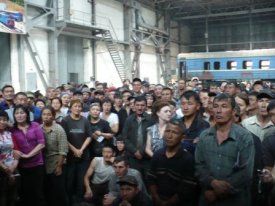Kazakhstan: state repression against the rising labor movement
 The situation in Kazakhstan worse. The workers especially in the enterprises of oil and gas sector has not abated, and gaining its momentum. The epicenter of the action becomes a western Kazakhstan, where the number of labor disputes from March of this year increased, and a prime example for the workers was a successful spring mass strike zhanaozenskih oil. Radicalization of demands and militant demonstrations and strikes were met with arrests by the authorities and the courts over the leaders of the protesting workers.
The situation in Kazakhstan worse. The workers especially in the enterprises of oil and gas sector has not abated, and gaining its momentum. The epicenter of the action becomes a western Kazakhstan, where the number of labor disputes from March of this year increased, and a prime example for the workers was a successful spring mass strike zhanaozenskih oil. Radicalization of demands and militant demonstrations and strikes were met with arrests by the authorities and the courts over the leaders of the protesting workers.
The strike wave swept across many companies KazMunaiGaz, covering in early June divisions EmbaMunaiGas and spread in the Chinese fiefdom - "CNPC-Aktobemunaigaz in Aktobe region.Then on July 1 outburst of discontent payroll thundered at "Zhayykmunaygaze" in Atyrau region. While atand presentations were incremental and can speak with confidence about the symptoms of impending general strike oil.
It is likely that powerful of the workers' OzenMunayGaza "can once again repeated with a new even more strongly, as many agreements with the government officials have remained on paper, but in terms of working independent trade union activists and leaders strike committees begins unprecedented pressure from security officials.Generally it can be argued that the only method of communication of the authorities with labor collectives becomes baton repression. As in March, Zhanaozene, employers preferred method is to feed the workers leaders in the courts to recognize the strikes illegal, which is a convenient basis for subsequent dismissal and disciplinary action against the strikers. It reportedly working activists Zhanazhol June 18 on their leaders held an emergency court, "for organizing and participating in an illegal strike."All nine men were found guilty, and three of them were fined, each amounting to 707 tenge (about U.S. $ 5). Workers Zhanazhol and oil deposits Kenkiyak "CNPC-Aktobemunaigaz" significant sentenced in district court in Kandyagash to further harassment and dismissal. Recall that the drivers went on strike on June 16 convoys, and the next day they were supported by their counterparts from the field Kenkiyak. According to the chairman of the independent trade union "Narazylyk" Karlybaya Tolybaeva they are not going to stop and will continue to fight for higher wages and better working conditions until the end.The situation in the meantime the company continues to be tense and fraught with more repetition on a larger scale business presentations, as the employer and the Chinese government began to phase out these promises, only limited increases in wages by 20% in July and by 15% in October. It should be noted that parallel this court and filed a criminal case against an opposition figure Aktobe region Aidos Sadykov, who actively helped the workers "CNPC-Aktobemunaigaz" to create its own independent union.June 9 oilmen were leaving a rally in defense Aidos and believe these proceedings are politically motivated. And indeed such fears were completely justified, since the trial he was charged with "hooliganism, accompanied by resistance to the police" under Article 257, Part 2 of the Criminal Code (imprisonment up to five years). July 16 the court sentenced him to two years imprisonment
In Atyrau from 1 July to begin an unprecedented strike on "Zhayykmunaygaze", which paralyzed for a few days work of all producing units KazMunaiGaz in the country.The reason is the same - frustration payroll and inefficient management of the company. At this time the government has decided not to stand on ceremony and 5 July police arrested the seven days of trade union leader and activist Asylkhan Mussina Max Bakaeva.They were charged with organizing an unsanctioned rally, and in response the workers went on hunger strike in protest. On the second day of the strike police detained six more employees "Zhayykmunaygaza", but later were released, taking with them the receipt of refusal to continue the protest. Such actions prosecution, courts, police and intelligence services, only angered the workers, pushed them to even greater consolidation and the need to coordinate joint actions. And instead of solving socio-economic problems of workers, ensuring freedom of trade union activities and negotiate with the striking power driven into a conflict even deeper inside.Thus, the inevitable surge of new strike activity this summer and fall on businesses and industries oil companies. In this sense, the officials themselves help to increase the popularity of the slogan of nationalization and workers' control over production and distribution of profits. Repression afflict not only oil but also on the miners' ArcelorMittal Temirtau in the Karaganda region, which the authorities Shakhtinsk not only refused to hold a meeting in the palace of the miners on June 7, but a hunt for the leader of "Coal Miner's family, Natalia Tomilova.First, in the office of a public association off the electricity, then water, then started having problems with his own apartment, there were threats by the intelligence services in respect of teammates Natalia, and distributed free of mines in large circulation local newspapers with defamatory articles on the public figure. Today's speech, strikes and repression of the crisis clearly showed the former official trade union structures.At the next congress of the Federation of Trade Unions in 1916 the Republic of Kazakhstan in Astana, the delegates and the Secretary-General himself Siyazbek Mukashev fastidiously kept silent about the incredible tension of the struggle between workers and employers about numerous instances of illegal dismissal, prosecution and punishment of activists about unbelievable injuries and deaths of miners at factories and mines " Kazakhmys "," Arcelor Mittal Temirtau. At the same time, leaders of the union miners' Korgau "Mirgoyazov and" For Decent Work "Sergei Belkin also refused to come to the meeting of miners on June 7 in Shakhtinsk than once to convince the workers of the need to organize themselves and create their own independent trade union organization, with strong leadership and consistent Programme of Action.And that understanding is growing each time, with the rise of struggle and repression, which are no longer a deterrent capable safeguard the interests of corporations.






